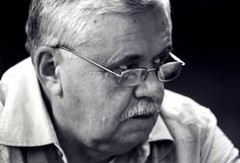 László Végel, a prose and dramatic writer, essayist and critic, was born in Srbobran in 1941. His literary career started in 1965 with the publication of his reviews in the cult magazine Új Symposion. He has been intensively present on the literary scene of Vojvodinian Hungarians, former Yugoslavia and Serbia ever since. He has collaborated with all prominent literary magazines of the region. After the 1989 social and political changes, he started publishing his books in Hungary and contributing to Hungarian magazines as well. In 2005 a short monograph about Végel’s opus entitled Végel-Symposion, containing selected reviews of László Végel’s works by Hungarian, Serbian, Croatian and Slovenian critics, was released in Budapest. The monograph editor Zoltan Virag states that the literary opus of László Végel is important, among other things, because it synthesises traditions and narrative impulses of Hungarian literature and literary discourses from the former Yugoslav territories. In this respect, László Végel equally belongs to Hungarian literature, but is simultaneously one of the few minority authors who have settled in the circulatory system of Serbian literature. As Aleksandar Tišma wrote, Végel is a prosaist of modern, urbane vocation and he is – according to Péter Eszterházy – a predecessor of Hungarian prose for this very capacity.
László Végel, a prose and dramatic writer, essayist and critic, was born in Srbobran in 1941. His literary career started in 1965 with the publication of his reviews in the cult magazine Új Symposion. He has been intensively present on the literary scene of Vojvodinian Hungarians, former Yugoslavia and Serbia ever since. He has collaborated with all prominent literary magazines of the region. After the 1989 social and political changes, he started publishing his books in Hungary and contributing to Hungarian magazines as well. In 2005 a short monograph about Végel’s opus entitled Végel-Symposion, containing selected reviews of László Végel’s works by Hungarian, Serbian, Croatian and Slovenian critics, was released in Budapest. The monograph editor Zoltan Virag states that the literary opus of László Végel is important, among other things, because it synthesises traditions and narrative impulses of Hungarian literature and literary discourses from the former Yugoslav territories. In this respect, László Végel equally belongs to Hungarian literature, but is simultaneously one of the few minority authors who have settled in the circulatory system of Serbian literature. As Aleksandar Tišma wrote, Végel is a prosaist of modern, urbane vocation and he is – according to Péter Eszterházy – a predecessor of Hungarian prose for this very capacity.
Works:
Novels: Memoirs of a Pimp (Egy makró emlékiratai, 1967); A Course in Passion (A szenvedélyek tanfolyama, 1969); Double Exposition, (Áttün(tet)ések, 1984); The Novi Sad Trilogy – Memoirs of a Pimp, Double Exposition, Ekhard’s Ring (Újvidéki trilógia – Egy makró emlékiratai, Áttüntetések, Eckhardt gyűrűje, 1993); Exterritorium (Exteritórium, 2000); Parainesis (Parainézis, 2003). Novelette collections: We Swear, with Our Eyes Full of Tears (Szitkozódunk, de szemünkből könnyek hullanak, 1969). Essay collections: The Challenge of Poem (A vers kihívása, 1975); Abraham’s Knife (Ábrahám kése, 1988); Giving up and Surviving (Lemondás és megmaradás, 1992); Wittgenstein’s Loom (Wittgenstein szövőszéke, 1996); The Great Central-Eastern-European Feast Enters the Picaresque Novel (A nagy Közép-Kelet-Európai Lakoma bevonul a Pikareszk Regénybe, beszély a pikareszk regényről, a story about picaresque novel, 1998); Life on the Edge (Peremvidéki élet, 2000); Dramatic text collection Judith (Judit, 1989), and diary notes Committing Time to Paper, in the Meantime (Időírás, időközben, 2003).
László Végel is an important dramatist; his dramas have been staged in Yugoslav theatres directed by such important directors as Dušan Jovanović, Ljubiša Ristić and Ljubiša Georgievski.
He has received the Mladost Award (1969); Ady Endre Award (1993); Nagrada slobodne štampe (Free Press Award) (1994); Déry Tibor Award (1995); Jelenkor Award (2000); The Republic of Hungary President’s Golden Medal for Literary Work (2000); The Hungarian Book of the Year Award (2001); Milán Füst Award for Prose of the Hungarian Academy of Sciences (2003); Kosut Award (2009).